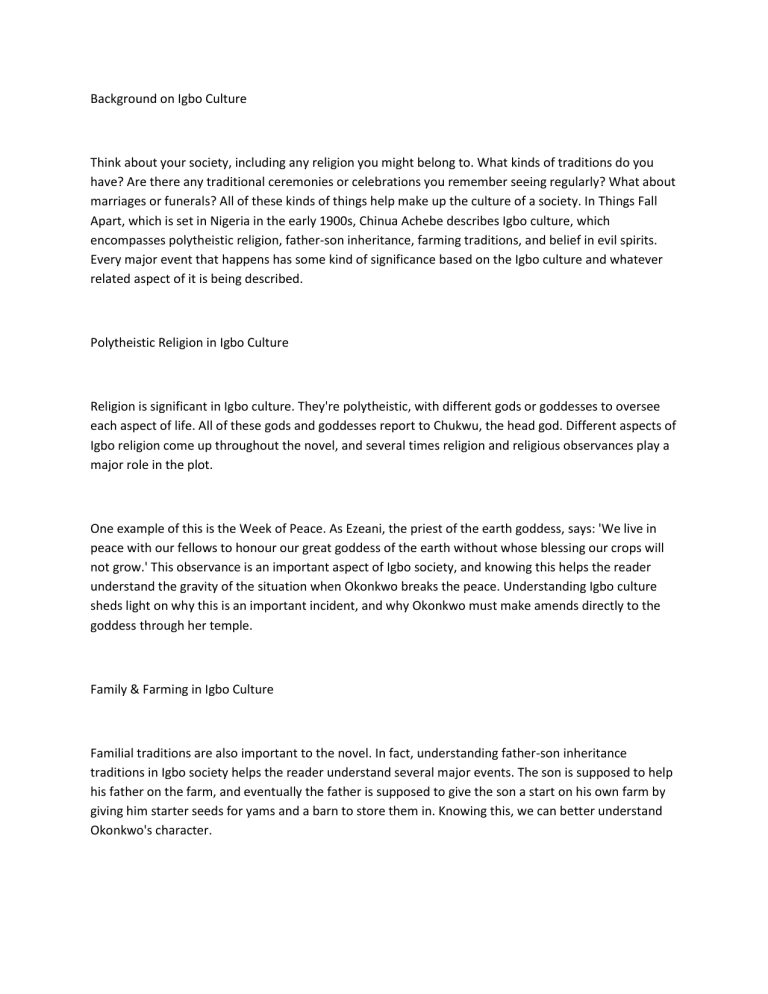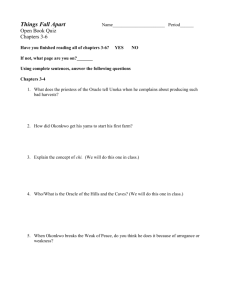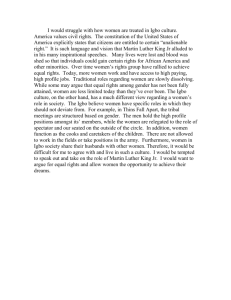
Background on Igbo Culture Think about your society, including any religion you might belong to. What kinds of traditions do you have? Are there any traditional ceremonies or celebrations you remember seeing regularly? What about marriages or funerals? All of these kinds of things help make up the culture of a society. In Things Fall Apart, which is set in Nigeria in the early 1900s, Chinua Achebe describes Igbo culture, which encompasses polytheistic religion, father-son inheritance, farming traditions, and belief in evil spirits. Every major event that happens has some kind of significance based on the Igbo culture and whatever related aspect of it is being described. Polytheistic Religion in Igbo Culture Religion is significant in Igbo culture. They're polytheistic, with different gods or goddesses to oversee each aspect of life. All of these gods and goddesses report to Chukwu, the head god. Different aspects of Igbo religion come up throughout the novel, and several times religion and religious observances play a major role in the plot. One example of this is the Week of Peace. As Ezeani, the priest of the earth goddess, says: 'We live in peace with our fellows to honour our great goddess of the earth without whose blessing our crops will not grow.' This observance is an important aspect of Igbo society, and knowing this helps the reader understand the gravity of the situation when Okonkwo breaks the peace. Understanding Igbo culture sheds light on why this is an important incident, and why Okonkwo must make amends directly to the goddess through her temple. Family & Farming in Igbo Culture Familial traditions are also important to the novel. In fact, understanding father-son inheritance traditions in Igbo society helps the reader understand several major events. The son is supposed to help his father on the farm, and eventually the father is supposed to give the son a start on his own farm by giving him starter seeds for yams and a barn to store them in. Knowing this, we can better understand Okonkwo's character. We see first of all that, 'Okonkwo did not have the start in life which many young men usually had. He did not inherit a barn from his father. There was no barn to inherit.' Because his father was broke, Okonkwo had to start his own farm from scratch by begging prominent village members for yam seeds, which he paid back after harvesting. In addition, the fact that Okonkwo had to work harder than anyone else to start off with helps us understand his fierce pride in his farm, and his desire to have his son continue the Igbo father-son tradition. This desire for tradition also shows up later in the novel. Okonkwo spends much of the novel training Nwoye, his eldest son, in the ways of farming, with the idea that he'll inherit Okonkwo's farm someday. Yet Nwoye ends up converting to Christianity and going off to school, leaving the farming life and Igbo traditions behind. Okonkwo's experience with his father, and how hard he had to work so he could create the farm he hoped Nwoye would inherit, makes this even harder for Okonkwo to accept.



